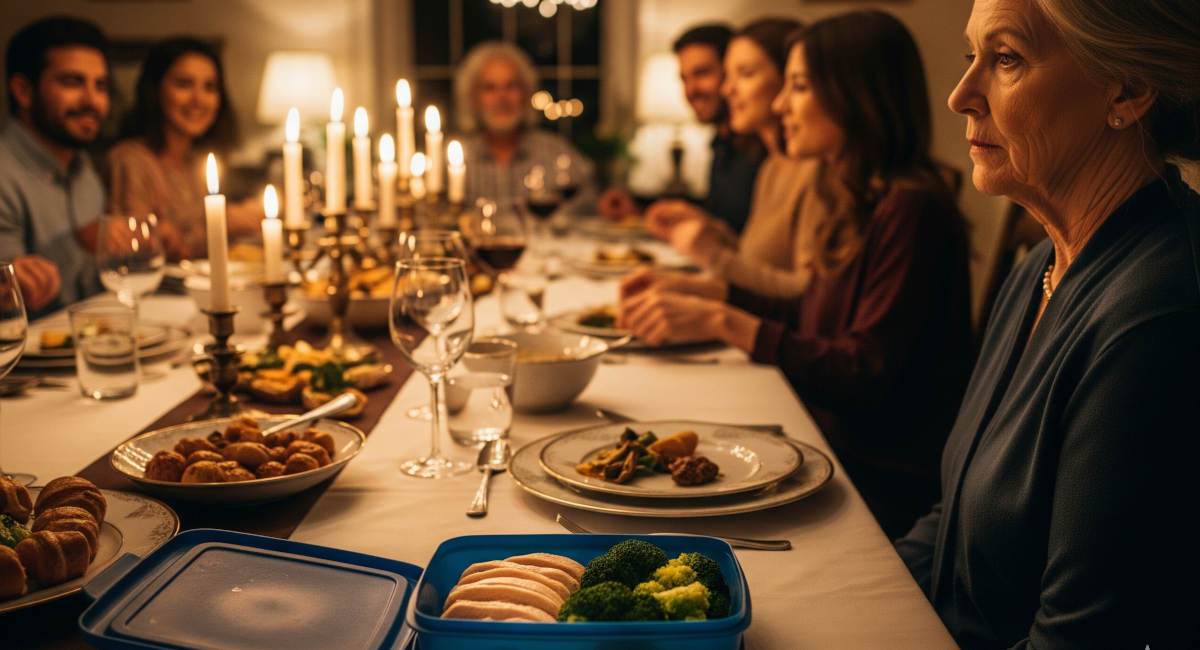The social contract of a family dinner is simple: the host cooks, and the guests eat. It’s a ritual of sharing and community. But what happens when one family member refuses to participate? For years, picky eaters have created awkward situations at the dinner table, but a story sent in by one of our readers takes this classic dilemma to a new level. It’s a tale of passive-aggression, culinary pride, and a Tupperware container that finally met its match.
Every family has ‘that’ relative. Ours is my Aunt Carol, a woman who has treated every family meal for the last decade like a potluck where only she was invited to bring a dish. Last weekend, after years of her quiet insults, I decided her reign of Tupperware terror was finally coming to an end.
The Tupperware of Judgment
For as long as I can remember, my Aunt Carol has not eaten food cooked by another family member. It doesn’t matter the occasion—Thanksgiving turkey, Christmas ham, birthday cake, summer BBQs—she always arrives with a smug smile and a large, insulated bag. Inside is her own meal, typically something bland and joyless like unseasoned chicken and steamed broccoli, packed in a conspicuous Tupperware container.
She makes a whole performance out of it. As the host is serving a dish they spent hours, or even days, preparing, Carol will loudly announce why she can’t possibly partake. “Oh, you know my sensitive stomach,” she’ll say. “I can’t handle all that oil,” or “My system just prefers cleaner food.” It’s a direct insult wrapped in a flimsy excuse of wellness, and for years, my family has just sighed and let it happen to “keep the peace.” But her pickiness isn’t a health issue; it’s a power move.
The Five-Course Trap
I love to cook. It’s my passion, and I take a lot of pride in hosting. So, when it was my turn to host my parents’ 40th-anniversary dinner, I decided enough was enough. I wasn’t going to let Aunt Carol and her Tupperware of Judgment ruin the special occasion. I devised a plan.
Two weeks before the dinner, I sent out elegant, printed invitations to the whole family. Inside, I had detailed a five-course tasting menu I was planning:
- Course One: Pan-Seared Scallops with a Lemon-Butter Sauce.
- Course Two: Wild Mushroom Risotto with Parmesan Crisp.
- Course Three: Classic Beef Wellington with a Red Wine Reduction.
- Course Four: Artisan Cheese Board with Fig Jam.
- Course Five: Chocolate Lava Cakes with Raspberry Coulis.
This wasn’t just a menu; it was a gauntlet. I was creating an environment so special, so celebratory, that showing up with a plastic box of boiled vegetables would look as absurd as it truly was.
A Cold Meal in a Warm Room
The night of the party, the trap was set. The table was covered in fine linen, lit by candles, and every place was set with multiple forks and wine glasses. The family arrived, buzzing with excitement. And then came Carol, insulated bag in hand. She walked in, saw the table, and for the first time, she looked a little unsure of herself.
As I began serving the courses, the backfire started in slow motion. While everyone else was gasping with delight over the beautiful, fragrant food, a profound sense of awkwardness settled around Carol. There she was, at the end of a gorgeous table, surrounded by family sharing a singular, joyful experience, while she quietly ate her sad, beige meal from its plastic tomb.
No one said anything. No one enabled her. They just… ignored it. The social chill was palpable. For the first time, her act didn’t make her look special; it made her look isolated and ridiculous. The final blow came with dessert. As everyone dug into their molten lava cakes, Carol sat with an empty place setting. Her own son, my cousin, finally leaned over and whispered, “Mom, this is really weird. You’re embarrassing yourself.”
Feeling the pressure, she snapped, but not at him. She looked at me and said, “Well, I think it’s very rude to show off like this and try to make people feel bad.” I just smiled calmly and replied, “I wasn’t trying to make anyone feel bad, Carol. I was celebrating my parents. You’re the only one who chose not to be a part of it.” The silence that followed was worth a decade of putting up with her nonsense.
She left right after that and is now telling everyone that I “ambushed” her with a fancy meal just to be cruel. Half the family is cheering me on, while the other half says I was passive-aggressive and should have just let her be. So, AITA for creating a situation where her rude habit would finally implode?
This is a masterclass in calling a bluff. For years, Aunt Carol used her special meals to hold a position of control, subtly judging everyone else’s choices. The narrator didn’t confront her with anger, but with excellence. She didn’t ban the Tupperware; she simply made it obsolete. By elevating the occasion, she forced her aunt’s long-standing habit out of the shadows and into the harsh light of social etiquette, where it couldn’t survive.
What do you think, readers? Was this a brilliant, passive-aggressive checkmate, or a cruel way to embarrass a family member? Share your thoughts in the comments below!



















0 COMMENTS